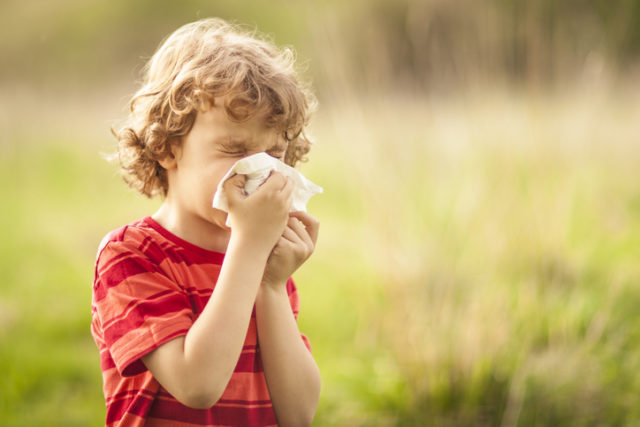
Fall or Spring: No matter the season, allergies can be imminent for your child
What should I do about my kids’ symptoms?
Allergies can present at any time but most commonly begin in childhood. Allergens are harmless particles of dust, mold, pollen, etc. that can trigger an allergic reaction in a sensitized individual. In a child with allergic tendencies, his/her immune system reacts to the allergens as a foreign invader which triggers a host of responses like sneezing, runny nose, cough, swollen nasal tissue, itchy or red eyes, dark circles, sore throat, or throat clearing. Worse even, if your child has asthma or eczema, allergens can trigger wheezing or cause eczema to flare up.
If your child has seasonal allergies, he/she will only display symptoms during certain times of the year since these allergies are triggered by various pollens such as grass, tree, flower, and ragweed. The levels depend on the living area and the time of the year. However, some children have perennial allergies, meaning they have symptoms year-round. The usual culprits in this situation include household allergens like dust mites, animal dander, molds, pests (cockroaches, mice, etc.), and tobacco smoke.
So, how can you ALL thrive during allergy seasons?
Let’s start with milder cases. There are several over-the-counter medications targeted toward allergy relief. The class of medications known as oral antihistamines is available at your local pharmacy in liquid, chewable tablets or pill form. These medications work by blocking histamine, the molecule that is responsible for the inflammation allergens produce in sensitized people. If you block histamine, you block some of the symptoms of allergies. Additionally, nasal corticosteroids act inside the nose to decrease swelling and inflammation. Some nasal corticosteroids can now also be found over the counter. These can be used alone or in conjunction with oral antihistamines. Itchy, watery eyes can also be treated with prescription antihistamine eye drops. With the multitude of products out there, it is best to call your pediatrician for their specific medication recommendation. Not one medication works for all children!
Tip: Start your child on the antihistamine before the allergies start to flair!
For instance, if your child has fall or spring allergies every year, start an over-the-counter antihistamine at the onset of the season to prevent symptoms. You don’t have to wait until they are completely miserable before giving them allergy medication. Also, most allergy medications work best if they are taken daily, rather than just here or there. Potential sedation caused by some allergy medications is a common concern for parents. Luckily, there are many allergy medications that are non-drowsy and shouldn’t affect your child’s energy level. Finding the one that works best for your child may take some time. Your pediatrician will work with you to find the appropriate medication to gain control of your child’s allergies.
Knowing what triggers your child’s allergies is key to preventing them, as avoidance is the best treatment.
For more severe or persistent cases, a referral to a pediatric allergist may be beneficial to pinpoint the offending agents. When medications alone are not sufficient to control allergies, some children benefit from immunotherapy (small doses of offending particles administered to the child over time—usually in the form of an injection) which can ultimately decrease your child’s reaction to the agents they are allergic to. This can be particularly helpful in children who have not only allergic rhinitis but also eczema and asthma.
So if you want your family to enjoy the beautiful weather that south Louisiana has to offer in the coming months, it’s great to know that most allergy-sufferers can have their symptoms easily managed in their primary care physician’s office.
Make sure you talk to your pediatrician about the best course of action for your family.